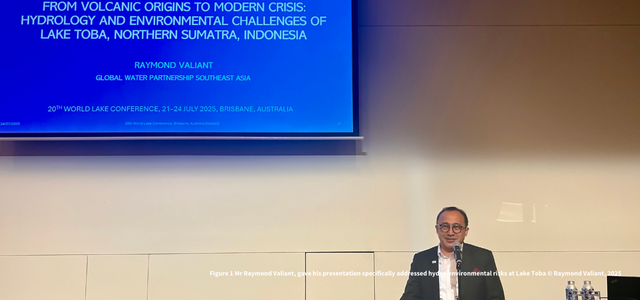Held from 21–24 July 2025, WLC20 was a powerful reminder that lakes reflect the health of their river basins, and that integrated, resilient management strategies are more urgent than ever. In the face of climate change, these natural water bodies are increasingly sensitive to human interventions and environmental pressures.
WLC20, organized by the International Lake Environment Committee Foundation (ILEC) and Griffith University, brought together a vibrant mix of policymakers, researchers, engineers, and practitioners working to shape a more sustainable future for lakes. Mr Raymond Valiant, representing Global Water Partnership Southeast Asia (GWP SEA), brought crucial insights by delivering two thought-provoking talks.
First, on lakes as part of holistic and anticipatory landscape stewardship, within the Indonesian context, on Tuesday, July 22, at the workshop session on “Lakes in the landscape: anticipatory and holistic stewardship panel.” The talk focused on drawing international attention to the lakes of Indonesia. As an archipelago with a history of tectonic and volcanic activity, Indonesia’s hydrosphere has been influenced by these factors and exhibits distinct characteristics. Experience in lake management issues in Indonesia was briefly discussed.
Further on the efforts to rescue Indonesia’s priority lakes, on Friday, July 24, at the workshop on “Rescuing Indonesia’s national priority lakes.” The presentation specifically addressed hydro-environmental risks at Lake Toba, Asia's largest volcanic lake, which is currently facing challenges related to spatial and demographic changes. The talk was based on data collected at the lake over the last 10 years.
One particularly inspiring moment was witnessing the youth delegation from Lake Biwa, Shiga Prefecture, Japan, share their passion and commitment to protecting freshwater ecosystems.
The Regional Coordinator was also able to reconnect with Prof. Brian McIntosh and Prof. David Hamilton of Griffith University for potential collaboration, and to meet Regina Souter and Bronwyn Powell from the International Water Center of Australia. It was also an opportunity to meet the Indonesian colleagues from the Indonesian Center for Innovation and Research, as well as the Ministry of National Development Planning.
As the climate crisis deepens, the stories and strategies shared in Brisbane are a powerful reminder: protecting lakes is not just an environmental priority; it is a collective responsibility.
